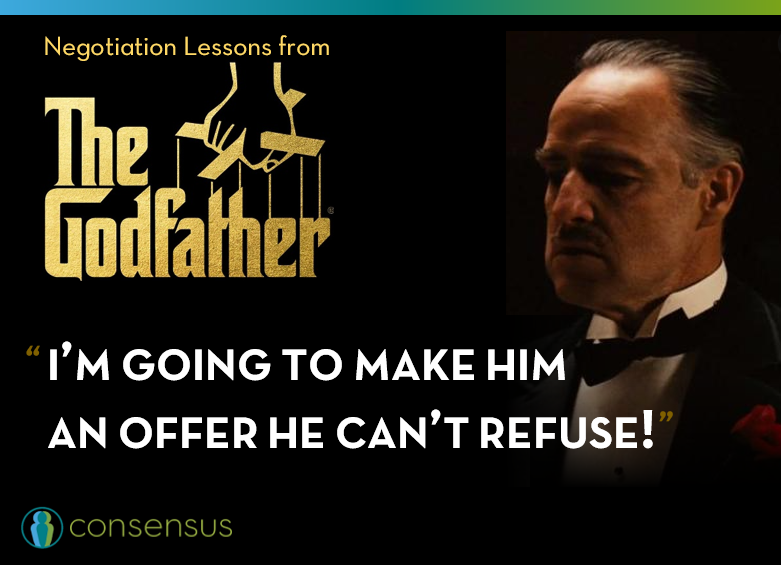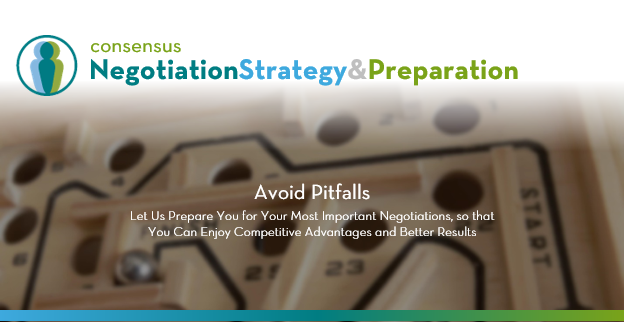Negotiation Lessons from The Godfather

Negotiation Lessons from The Godfather
“I’m going to make him an offer he can’t refuse!”
It’s one of the most quoted movie lines in the history of cinema. Spoken by Marlon Brando’s character Vito Corleone in the acclaimed movie The Godfather, this sentence almost single handedly created the trope of the tough gangster negotiator. It’s the ultimate final word, a line which transforms the situation from a contest of wills to a statement of ultimacy.
It’s a line that any professional can learn from.
In the movie, Vito Corleone – the eponymous “Godfather” – addresses his godson, Johnny Fontane, a successful singer whose star is fading. Johnny has been trying to get a role in an upcoming movie in hopes that it will revitalize his career. Unfortunately for him, the head of the movie studio, Jack Woltz, has rebuffed all of Fontane’s attempts to secure the part, and made it clear that this is a point on which he will not budge.
Fontane is at his wit’s end, and fears that his time in Hollywood is over. It is with the famous line that the Godfather assures him with, “I’m going to make him an offer he can’t refuse” that there is nothing to fear and that Fontane will ultimately get the role in Woltz’s film. The implication of the line, of course, is that Woltz’s life will be threatened, and he will find that not agreeing to Corleone’s demands (his alternative or walk-away plan) is so dire that he will have no choice but to accept Corleone’s “offer”.
While most of us don’t fear bodily harm or violence when negotiating, the likelihood of facing a critical threat (that critically raises the stakes) at some point is real. Accordingly, it is worth looking at this famous interaction to understand the do’s and don’ts when threats might be at play.
The Godfather: Analyzing the Negotiation
There are several parties involved in this Godfather negotiation. They include Vito Corleone and Jack Woltz, as mentioned earlier. Yet, a third and critical party to this negotiation is Tom Hagen, Vito’s levelheaded advisor. In the movie, it is Hagen who interacts directly with Woltz; Corleone’s involvement is entirely indirect, through his negotiation partner Hagen.
Corleone, upon hearing the predicament of his godson, defaults to threats – the famous line in question being the go-ahead for Hagen. This is before any communication has transpired with Woltz. It’s Corleone’s negotiation strategy.
When Hagen meets with Woltz, he adopts a different strategy. Not only doesn’t he threaten Woltz, but he instead offers to create value for Woltz by resolving union issues that negatively impacting the production of Woltz’s new movie. Woltz does not reciprocate. Instead, he refuses to explore solutions, and threatens to “make so much trouble” for Hagen and Fontane’s team.
Despite Woltz’s threat, Hagen continues to treat Woltz amicably. In doing so, he influences Woltz’s behavior, and leaves the door open for future dialogue. And, indeed, Woltz later reopens negotiations by inviting Hagen to his home.
While, to his credit, Woltz starts their second meeting with niceties and other relationship building efforts. He also offers to accommodate Corleone in other ways. However, he makes the mistake of focusing on a single interest of his – avoiding looking ridiculous – to the exclusion of other unrecognized interests. And, this focus on personal reputation and public opinion stirs his emotions to the point that they take over, and he is back to making threats.
Conversely, Hagen controls his emotions. He not only keeps his composure, but continues to politely engage Woltz when excusing himself – “Thank you for the dinner and a pleasant evening.” Hagen knows that the solution to the matter of hand is in negotiation strategy.
Hagen turns his attention to addressing Woltz’s inferred interests, namely personal safety and financial gain. Woltz had been under the illusion that he wasn’t vulnerable to potential violence by Corleone. He had explicitly underscored this in telling Hagen that he “ain’t no bandleader”, referring to a bandleader that cowed a Corleone threat. Hagen identifies a means of bringing both of these interests to the forefront of Woltz’s consciousness – by beheading a stud horse and infiltrating Woltz’s personal bedroom without detection.
In so doing, Woltz realizes that he cares about more than just his reputation, and understands that Corleone’s offer addresses those other interests. He also understands that his walk-away plan of giving the role to anyone other than Fontane has dire consequences.
In the end, Fontane gets the role.
The Godfather: Negotiation Lessons
As professionals, we are bound to face threats in our negotiations. A customer may threaten to walk if a discount is not granted. A manager might demand that you work through the weekend if you want to have a job on Monday. Take the deal as-is or get nothing.
From The Godfather we can derive the following best practices:
Recognize & Acknowledge All Your Interests
Certainly, Woltz neglected to understand his interests beyond ego and reputation. Vito might have overlooked critical interests, as well – he might have underestimated his desire to be seen as a force to be reckoned with by people beyond the Woltz-negotiation.
When negotiating, explore the tangible, psychological, emotional, reputational, etc. motivators you might have. For example, when considering a negotiation about compensation, understand what the money represents for you – spending power, status, appreciation, etc. A deeper awareness of these factors will allow you to explore different options/agreement terms for meeting those interests.
Avoid Threatening or Antagonizing Your Counterpart
Corleone defaults to threatening Woltz’s life from the get go. Had Hagen adopted Corleone’s strategy and threatened Woltz’s life from the outset, there is a good chance that Woltz wouldn’t have taken him seriously. Then the Corleones would have faced the choice of either:
a) Killing Woltz – doing so would have failed to satisfy their interest of securing the part of Fontane, or
b) Not Following through on Their Threat (Immediately) – doing so would have jeopardized their interest of being seen as a force to be reckoned with
Similarly, Woltz defaults to threats, including, “Johnny Fontane will never get that role!” It’s clear that the combination of (i) that threat and (ii) Woltz’s capitulation in the end, does nothing to meet Woltz’s interest of protecting his reputation (i.e., of looking strong and “not ridiculous”).
While there might be instances in which “threatening” a counterpart is called for, it generally isn’t at the outset of a negotiation (and, most often, threatening can be avoided altogether). Instead, follow Hagen’s example of approaching the matter amicably with a focus on opportunities for mutual gain.
Understand Your Counterpart
Woltz underestimates his counterpart, their resolve, and their capabilities. Don’t make that same mistake. Equally as important: don’t overestimate your counterpart.
Understanding your counterpart and their walk-away plans, and comparing their walk-away alternatives to your own helps inform points of leverage. In The Godfather, Woltz thinks he has all the leverage in his negotiation with Hagen. The audience knows that to be the furthest thing from the truth.
Acknowledge the Impact Your Emotions Have
Woltz’s emotions cloud his judgement and lead to bad behavior and worse decisions. In fact, he mistakes his emotional need as being is only interest in the negotiation.
Meanwhile, Corleone is also affected by his emotions (his care for his godson, Fontane), which leads to hasty decisions and a questionable strategy (i.e., threatening Woltz from the outset). This is the more common mistake made by negotiators: they focus on the material or business interests at stake, and ignore the emotional and psychological factors at play. An option agreement will satisfy all of the parties’ underlying interests, including emotional and psychological.
Unlike Woltz and Corleone, savvy negotiators know to deescalate their emotion reactions before they begin negotiating and, if needed, throughout the negotiation. When the situation at hand makes that challenging, it is best to introduce a third party who is not as emotionally affected. Corleone unknowingly does this when he enlists Hagen to be his spokesperson. You might consider calling upon a disinterested colleague or friend, or even an outside professional to join your negotiation team and, perhaps, speak on your behalf.
A quick note on this: Had Corleone chosen someone with an adversarial bent (e.g. his son, Sonny) to negotiate in place of Hagen, Corleone would not have enjoyed the same benefits. Similarly, many professionals (e.g., attorneys) are conditioned to adopt adversarial mindsets and postures – they, therefore, often prove to be suboptimal negotiators and stand in the way of collaborative problem solving.
We were involved in a case in which the client was represented by a partner in a preeminent law firm. The partner generated an option that would have yield $X to the client; when the counterpart refused the option, the partner suggested that the client proceed with litigation. While our team might have underestimated the ramifications of changing the jurisdiction in the proposed agreement from New York to Delaware, we were successful at generating an option that yielded $10X+ for the client and kept the client outside of the contentious – and costly – courtroom. Legal matters are best left to legal experts; negotiation matters are best left to negotiation experts.
Here’s the irony: in the movie, Hagen was a lawyer. That just goes to show that not all lawyers are adversarial and confrontational…certainly not in Hollywood.
A Final Thought
Many fans of The Godfather would argue that Vito Corleone or his son, Michael, are among the coolest characters of all time. As negotiators, we tip our hat to Tom Hagen, a cool-headed character at the negotiation table.
What are your thoughts? We very much would like to know your ideas on this topic, as well as any other negotiation examples you would like us to analyze. Please be sure to use the link below to leave your comments (on the LinkedIn posting) or, even better, Contact Us at your convenience.
If You would like to learn more about how our Negotiation Consulting services might help you and your organization realize better negotiation results, we would love to connect with you. Similarly, if
You would like to learn how our Customized Negotiation Training Workshops could help you and your staff, please do not hesitate to reach out.
Please feel free to contact us at any time!

We invite you to learn more about our
Professional Negotiation
Services

Please choose the option that is most convenient for you:
• Call us at +1 (212) 391-8100
• Email us at inquiry@consensusgroup.com
• Use our Online Form and we will contact you
